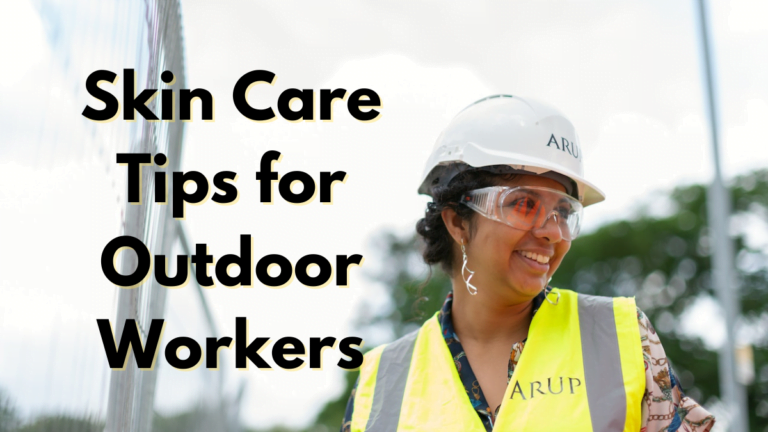Working in the field (outdoors) can be both enjoyable and rewarding, but it also exposes you to various environmental elements that can harm your skin. From UV rays to harsh winds and extreme temperatures, prolonged exposure to these elements can lead to various skin problems, including sunburn, premature aging, and even skin cancer. As such, it is essential to protect your skin when working outdoors.
This article will provide some practical tips for keeping your skin healthy and protected while working outdoors.
Skin Care Tips for Outdoor Workers
1 Wear Protective Clothing
Wear protective clothing is one of the most effective ways to protect your skin when working outdoors. This includes long-sleeved shirts, long pants, hats, and sunglasses. Opt for lightweight, breathable fabrics that offer sun protection, such as cotton, linen, and polyester. Avoid tight-fitting clothing as it can cause chafing and skin irritation.
Choose styles that shade your face and neck when it comes to hats. Wide-brimmed hats are an excellent option as they offer ample protection from the sun. Sunglasses with UV protection are also crucial, as they protect your eyes and the delicate skin around them from harmful UV rays.
2 Apply Sunscreen
Sunscreen is a must when working outdoors, even on cloudy days. Apply a broad-spectrum sunscreen with an SPF of at least 30 to all exposed skin, including your face, neck, and hands. Be sure to apply sunscreen at least 15 minutes before going outside and reapply every two hours or more frequently if you’re sweating or swimming.
Look for sunscreens that contain ingredients like titanium dioxide or zinc oxide, which are physical blockers that reflect UV rays. Chemical sunscreens, such as oxybenzone and octinoxate, absorb UV rays and can cause skin irritation in some people.
3 Stay Hydrated
Staying hydrated is essential for overall health, but it’s also crucial for maintaining healthy skin. Working outdoors exposes you to environmental elements that can dehydrate your skin, leading to dryness, flakiness, and even cracking. Drinking plenty of water throughout the day can help keep your skin hydrated and prevent these problems.
The water you need to drink varies depending on your age, weight, and activity level. Generally, aim to drink at least eight glasses of water per day. If you’re working outdoors in hot and humid conditions, you may need to drink more to replace the fluids you lose through sweat.

4- Take Breaks in the Shade
If possible, take breaks in the shade when working outdoors. This can help reduce your overall exposure to the sun’s harmful UV rays and give your skin a chance to cool down. Look for areas with natural shade, such as trees, or bring your own shade, such as an umbrella or canopy.
Taking breaks in the shade can also help prevent heat exhaustion and other heat-related illnesses. If you start feeling dizzy, lightheaded, or nauseous, take a break in the shade and drink some water.
5- Use Moisturizer
Working outdoors can take a toll on your skin, leaving it dry and flaky. To keep your skin moisturized, use a daily moisturizer that’s appropriate for your skin type. Look for moisturizers that contain ingredients like glycerin, hyaluronic acid, and ceramides, which help to hydrate and repair the skin’s barrier.
Apply moisturizer immediately after showering or washing your face to lock in moisture. If you’re working outdoors in cold and windy conditions, you may need to apply moisturizer more frequently throughout the day.
6- Avoid Peak Sun Hours
The sun’s UV rays are strongest during peak sun hours, which are typically between 10 am and 4 pm. Try to avoid working outdoors during these hours if possible. If you must work during peak sun hours, take extra precautions to protect your skin, such as wearing protective clothing, using sunscreen, and taking breaks in the shade.
7- Check Your Skin Regularly
Regularly checking your skin for any changes or abnormalities can help detect skin cancer early. Look for any new or changing moles, freckles, or other spots on your skin. If you notice anything unusual, visit a dermatologist for a skin exam.
8- Seek Shade
When working outdoors, seek shade whenever possible. Whether under a tree or an umbrella, staying in the shade can help reduce your exposure to UV rays. If you’re working in an area without natural shade, consider bringing your own shade, such as a pop-up tent or canopy.
Conclusion
In conclusion, protecting your skin when working outdoors is essential for maintaining healthy skin and preventing skin damage. By following these tips, you can help reduce your exposure to environmental elements and keep your skin protected and healthy. Wear protective clothing, sunscreen, stay hydrated, and seek shade whenever possible. Regularly checking your skin for changes and abnormalities can also help detect skin cancer early. Stay safe and enjoy working outdoors.


